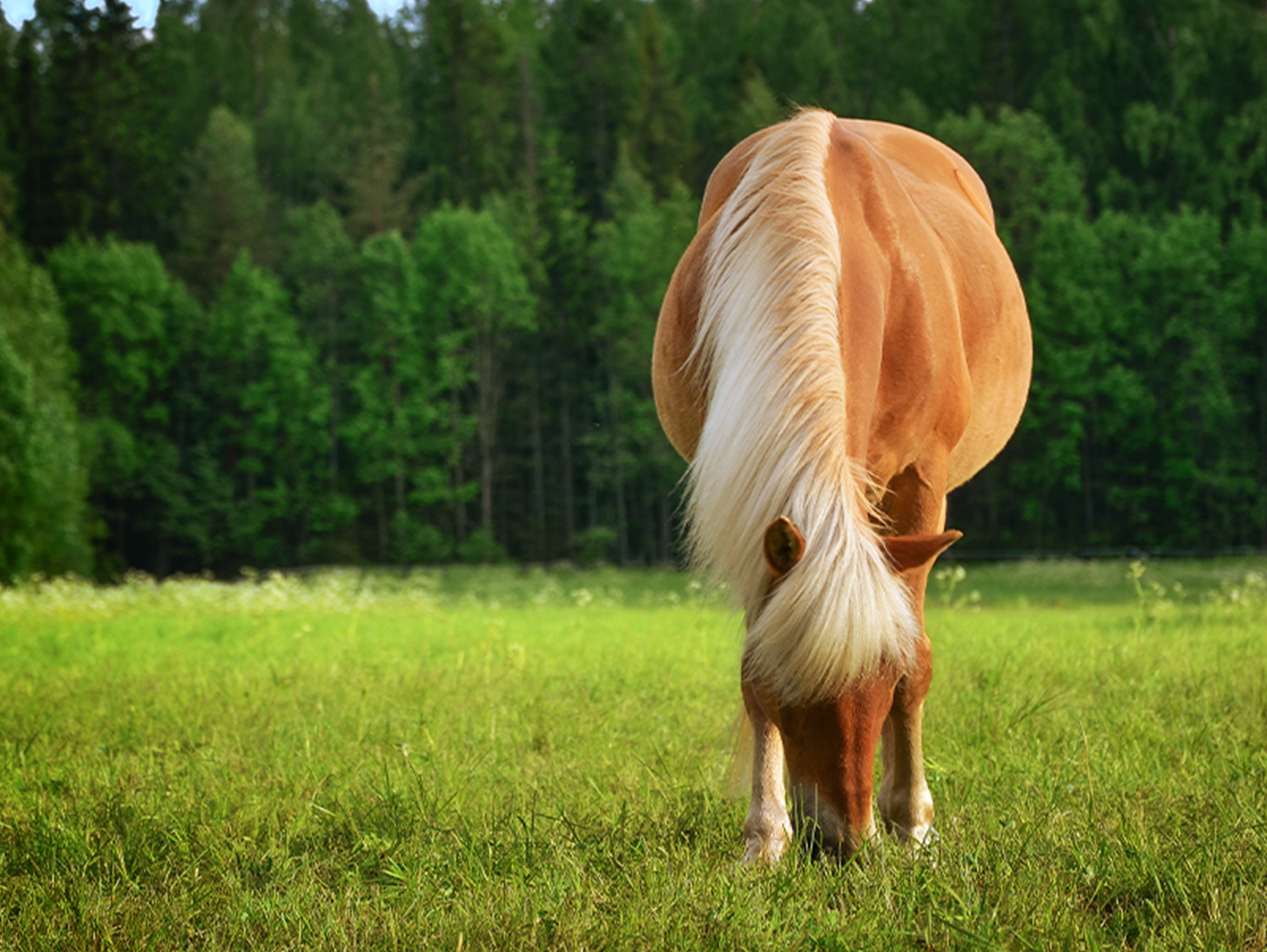As winter fades and spring comes, horse owners eagerly await the return of green grasses and lush pastures and seeing their horses graze on free range once again. But, there's something you need to be careful about – a condition called grass founder.
What is a Grass Founder?
During the springtime, when it's sunny and warm during the day but still chilly at night, horses can get a condition called grass founder. This happens when their hooves don't get enough blood flow, or they overeat grass, which can be toxic.
Inside a horse's hoof are parts called laminae that help hold everything together. These laminae become weak when inflamed due to insufficient blood flow or toxins. This weakness can cause the coffin bone, which the laminae support, to shift downwards, causing pain and discomfort.
In extreme cases, the coffin bone might even poke through the bottom of the hoof, and sadly, this usually means the horse has to be put down.
What’s in the Grass that Leads to Founder in Horses?
Grasses growing during the spring store a lot of energy in the form of fructans (sugar), especially when there's plenty of sun. Fructans are carbohydrates that grass uses for growth. The highest fructan levels are usually in the grass around midday, while they're lowest in the early morning.
When horses consume a lot of grass with high fructan levels, it can increase certain bacteria in their intestines. These bacteria make toxins that end up in the horse's bloodstream. Eventually, these toxins reach the hooves and cause inflammation.
What Causes Grass Founder in Horses?
There are five main reasons why horses can founder—
- Insulin problems,
- Sudden sickness,
- Overeating of the grass,
- Foot problems from movement and
- Reactions to certain medications.
Insulin is super important for a horse's hoof health. If insulin isn't working right, because of being overweight or certain health issues, it can cause grass founder. Being too heavy is the biggest reason horses get founder.
When horses get sick, like digestive issues or high fevers, they are also more likely to get founder because this causes a lot of body inflammation that can affect their hooves.
Overeating grain or grasses all at once or lack of exercise in overweight animals can also be one of the reasons behind getting grass founder.
Horses need to walk around to keep their hooves healthy. If they can't move right for a long time, it can cause foot problems, leading to founder. This can happen from injury and being on long-term stall rest.
Sometimes, if horses take a lot of prescription drugs like dexamethasone or prednisolone, it can also cause a founder issue, but this is rare.
Signs and Symptoms of Grass Founder
Grass founder usually affects the front feet of horses but can happen in any of their four feet.
Common signs include—
- Sudden limping in both legs
- Not wanting to walk or move
- Feeling a strong pulse and warmth in the foot
- Shifting weight between legs
- Being hesitant to lift their feet
- Standing with legs strangely positioned or lying down more often
Sometimes, horses might develop long-term lameness. Even if its hooves look different, it might not show signs of pain or limp.
Signs of long-term lameness to watch for include—
- A dip on the top of the hoof
- Rings on the hoof that are tight at the front and broad at the back
- A wider white line
- Foot sores that show up a few weeks after the lameness starts
How is Grass Founder in Horses Diagnosed?
To find out if a horse might have grass founder, it's essential to know their background. The vet might ask—
- Your horse's age and weight
- Whether or not they started eating different food recently, like new grass or more grain?
- Did something happen to them lately, like getting sick or having a bad injury?
- Are your horses under any medication?
The vet will then check the horse's body and watch its walk. A stiff walk, especially in the front legs, is a common sign of grass founder. The horse might also have trouble turning in circles.
The vet will feel the horse's legs to see if there's a strong pulse, which could mean swelling in the hoof. They might also press on the frog to see if it hurts.
Finally, the vet might take X-rays to check that the hoof bones are in the right place. Sometimes, if the condition has just occurred, they might not immediately see any changes. The problem can take time to show up on X-rays.
Treatments and Preventive Measures for Horses with Grass Founder
Supportive treatments for grass founder in horses involve—
- Giving anti-inflammatory and pain-relieving medications,
- Helping the horse's hooves with special wedges or inserts and
- Keeping the horse in a stall to rest.
If a horse has foundered before, there is a possible chance they could relapse, so it's crucial to take steps to prevent it.
Managing pastures well is crucial to prevent founder, especially in spring when grass grows fast. Limit spring grazing while grasses are most lush and high in sugar content. Horses may need to be restricted to dry lots during this time and provided other source of free choice hay.
Introduce them to the pasture gradually. You can also give them hay before they go out or use a grazing muzzle to limit their grass consumption. The goal is to control their intake until the grass slows down. The best way to deal with grass founder is to prevent it from happening in the first place.
Feeding your horse a balanced diet and hoof care all year round ensures that your horse gets the proper nutrition for healthy hooves. This gives your horse a good base and helps handle any upcoming challenges.
Manage Grass Founder in Horses with Med Vet Pharmaceuticals
Grass founder in horses is a serious issue, especially when grass grows rapidly in spring. It can cause your equine friends a lot of pain and discomfort. However, you can protect your horses from this painful condition by understanding the causes and symptoms and taking preventive measures, such as careful pasture management and monitoring their diet.
At Med Vet Pharmaceuticals, we understand how a little awareness and proactive care can go a long way in keeping your horses healthy and happy. Check out our horse hoof care supplements to keep your equine hooves healthy and prevent issues like grass founder.
If you have any questions about which product is best for your horse, don't hesitate to contact us or call 833-809-4848. We're here to assist you!

